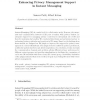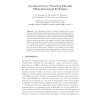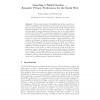116
click to vote
IWC
2010
15 years 16 days ago
2010
Instant Messaging (IM) is a useful tool for collaborative work. However, the awareness and communication features of IM pose a tension with privacy desires. Inadequate support for...
100
click to vote
CACM
2000
15 years 1 months ago
2000
data model provides an abstract, conceptual framework; a concrete syntax is also required and XML is used for this purpose. The XML namespace mechanism serves to identify RDF Schem...
128
click to vote
CCS
2010
ACM
15 years 2 months ago
2010
ACM
Privacy is a huge problem for users of social networking sites. While sites like Facebook allow individual users to personalize fine-grained privacy settings, this has proven quit...
138
click to vote
HUC
2010
Springer
15 years 3 months ago
2010
Springer
The rapid adoption of location tracking and mobile social networking technologies raises significant privacy challenges. Today our understanding of people's location sharing ...
114
click to vote
IJCAI
2003
15 years 3 months ago
2003
Abstract. Web service technology is an Internet-based distributed computing paradigm to address interoperability in heterogeneous distributed systems. In this paper, we present a p...
119
click to vote
DBSEC
2008
15 years 3 months ago
2008
Abstract. We propose a new privacy model for XML data called Privacy for All (P4A) to capture collectors privacy practice and data providers privacy preferences. Through P4A data c...
125
click to vote
DBSEC
2007
15 years 3 months ago
2007
The widespread adoption of mobile communication devices combined with technical improvements of location technologies are fostering the development of a new wave of applications th...
114
click to vote
SIGECOM
1999
ACM
15 years 6 months ago
1999
ACM
Privacy is a necessary concern in electronic commerce. It is difficult, if not impossible, to complete a transaction without revealing some personal data – a shipping address, b...
108
click to vote
ESWS
2010
Springer
15 years 7 months ago
2010
Springer
Abstract. With increasing usage of Social Networks, giving users the possibility to establish access restrictions on their data and resources becomes more and more important. Howev...
107
Voted
ACMICEC
2003
ACM
15 years 7 months ago
2003
ACM
The Platform for Privacy Preferences (P3P) provides a standard computer-readable format for privacy policies and a protocol that enables web browsers to read and process these pol...





